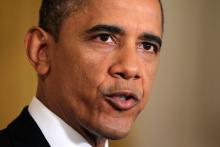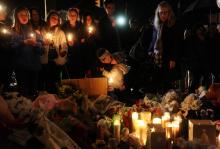mental health

It feels awkward and even a bit inappropriate to be talking about ‘celebrity news’ when so much is going on around the world: Iraq, refugees in Syria, children stranded at borders, Michael Brown’s death and Ferguson, Ebola, Ukraine, and the list tragically goes on.
But then again, it feels appropriate because it’s another reminder of the fragility of our humanity.
As has saturated the news, Robin Williams passed away this week. His life ended way too short at the young age of 63 – apparently because of suicide. While this was news to me, Robin had been struggling with intense depression – especially as of late — and was recently diagnosed with Parkinson's Disease.
To be honest, I don’t get caught up too much on celebrity happenings mainly because there’s not much genuine connection. I don’t really know them personally. Make sense? Robin Williams’ death – on the other hand – just felt like a painful punch in the gut. Perhaps, it’s because Mork and Mindy (Nano Nano) was the first TV show I watched (along with Buck Rodgers) after immigrating to the United States. I deeply resonated with Mork – this ‘alien’ or ‘foreigner’ from another land trying to fit in. Perhaps, it’s because so many of the characters he played in countless movies influenced me on some level as it did so many others.

Yesterday morning I was prepared to write about being a sacred place where others could come for healing, encouragement, and restoration. I had no idea Robin Williams committed suicide yesterday. I didn't hear the news because all evening I was sitting with a friend who is going through one of the most difficult times in her life. I also rushed out the door this morning with two friends on my heart who were also going through a great deal of suffering. It was late morning before I found out Robin Williams passed away. Robin Williams, the great comedian? The one who warmed my heart in Patch Adams. The man who challenged me, through Patch Adams, not to just be a professional, but a professional who cared for people.
I've read a lot of posts on Facebook about how we (those still living) never know what a person is going through on the inside. I've read that a person can be smiling on the outside, but hurting on the inside. While this is certainly true for some, I find many who are hurting tell us they are hurting. In their efforts to reach out, we often shut the door on them. Sure, the first time or two we listen and tell them we are going to pray for them, but then they become "needy." I don't know how many times Christians have warned me to stay away from a person because they are "needy" or "too clingy." I remember one time thinking, "Why wouldn't they be needy?" I thought this because we both (the commenter and I) knew the horrible situation our sister was in. I couldn't imagine the pain she was going through. However, this person believed our sister in Christ was being too "needy."
While I believe that we should never replace God by trying to be the Savior, I do believe we should be a place where those who are hurting can come.

I log onto Facebook every day. It tells me that it’s OK to talk about a bad date, to engage in family arguments for all to see, or even to display how envied one believes him/herself to be via self-portraits from a bathroom mirror.
Let’s be honest. Social media has caused an eruption of platforms in which people across the globe feel comfortable laying it all out there. There is a certain acceptance of divulging personal information that my parents’ generation wouldn’t dare ever bring up in a private forum, much less a public one. This phenomenon raises the question: If it’s OK to talk about almost anything these days, why are important topics still being held captive in the land of anonymity?
Abortion. Incest. Rape. Bankruptcy. Depression. Mental illness.
And then there’s suicide.
So why write about it now? Because I fell into the trap of ignoring an important topic simply because it had never hit close to home. And then came the phone call.

On June 10, Emilio Hoffman, a 14-year-old student at Reynolds High School in Troutdale, Ore., was transformed, from a good-hearted kid with his life ahead of him to a statistic.
He was an athlete, a soccer coach, a people pleaser, a brother, a son. He had a girlfriend, and he loved to make people laugh.
Now, he’s a red dot on a graph, one blip in an “American victims of gun violence” total that is already absurdly high, and will no doubt be higher the next time you check it.
Emilio’s crime? He went to school, on a day that another student decided — for reasons none of us can fathom — to bring an AR-15 rifle from home and start shooting people.
What happened to Emilio is not a tragedy. A tragedy is when something happens that no one could have helped: an accident, a natural disaster, a crime that could not have been foreseen or prevented.

One in four individuals will suffer with a mental health issue in a given year — and that these statistics can often be our friends, family, or ourselves. After tragedies like what happened in Isla Vista and on Seattle Pacific’s campus, we listen to the voices of victims’ families and mourn with them as they share stories of their lost loved ones. But we ignore an even more painful story about the lives of the gunmen.

Churches are supposed to be communities that represent Christ’s infinite love — and many of them do — but certain groups of people seem to be continually ignored, alienated, undervalued, and simply lost within American churches. Leadership structures, social expectations, religious values, and traditions within faith communities have a tendency to favor some groups but not others, resulting in discrimination instead of equality, exclusion instead of acceptance, and prejudice instead of fairness.

A few weeks ago, I asked folks on Twitter, and specifically, my colleague Amy Simpson, who has recently published a book on mental illness and the mission of the church:
What do you think about the way people use words like “bipolar,” “crazy,” and “manic” when they really mean “moody,” “energetic,” “quirky” and even “fun?"
It’s part of a pattern I’ve noticed lately — and maybe you’ve noticed it too.
People with beautiful head shots, flawlessly designed websites, and enviable accomplishments insist that they are really just a ‘mess.’ Or that their families are ‘crazy.’ Or that their homes and lives are every bit as complicated and frustrating as everyone else’s … meanwhile, their Instagram feeds show nothing but beauty; if ‘chaos’ is there, it’s only ever of the picturesque kind.
There are no birdcages sprouting stalagmites and stalactites of bird droppings. There are no snotty-nosed, unwashed, half-dressed, hungry children who’ve never visited a dentist in their lives. There is food in the fridge and on the table, and it isn’t even growing mold or crawling with roaches or undulating with maggots. In fact, it’s from Trader Joe’s and may even be organic! There is no broken glass or police officers showing up because the neighbors heard screaming. There is electricity and running water and indoor toilets.
Yeah, there’s raised voices and tempers and conflicts. But that makes you human. Not crazy. Not dysfunctional. Not “a mess.”

“Blessed are the peacemakers, for they will be called the sons [and daughters] of God.” Matthew 5:9
The news cycle, the blogosphere, and social justice advocates often focus upon crisis, tragedy, and pain. Moments of freedom, of healing and hope are often drowned out by the cacophonous sounds of self-interest, fear and danger. Today I’d like to silence that cacophony and trumpet loudly about the brave and humble Antoinette Tuff, a peacemaker filled with the Spirit of God, who faced a gunman with her arsenal of love and compassion and saved a school full of children.
Antoinette Tuff’s faith and courage changed the outcome of history on Tuesday, Aug. 20. It is a day that will not live in infamy. Unlike other days that started on a similar path to violence, families did not grieve the loss of their children to the would-be mass gunman who walked into an elementary school with almost 500 rounds of ammunition. Police were scrambled to the scene, but did not have to evacuate classrooms of frightened children watching for a shooter. In fact, despite the heavily armed suspect and a heavily armed law enforcement response, not one person lost their life.
Following the movie theatre massacre in 2012 that killed 12 people, 126 others have died due to similar events involving mass killings. USA Today reports such tragedies are more “typical” than people think reporting that approximately every two weeks since 2006, a mass killing has occurred somewhere in the United States. USA Today reports:
A USA TODAY database of these shootings over the past seven years shows that what Americans experienced over the past calendar year is sadly typical. There have been 14 such incidents since Jan. 1 of this year, while 2012 actually had a low for the reporting period: 22 mass killings. The high was 37 in 2006, the first year of the examination. (The FBI defines mass killings as murders that occur in a short time span and in which four or more people are killed.)
Read more here.

On Tuesday, Angelina Jolie became the face of preventative mastectomy. In a beautifully worded New York Times op-ed, the actress said she opted for a double mastectomy after learning she had an 87 percent risk of breast cancer, adding, “On a personal note, I do not feel any less of a woman. I feel empowered that I made a strong choice that in no way diminishes my femininity.”
In the hours following the publication of Jolie’s story, others came forward with their own stories, and the media coverage since has been non-stop. However, when a similarly famous actress, Catherine Zeta Jones, came forward with her diagnosis of bipolar II disorder, it made only a news ripple compared to the crashing wave of coverage Jolie’s disclosure has received. Don’t get me wrong — Jolie’s announcement is hugely significant and part of a much-needed conversation. But mental illness should be afforded the same level of discourse. Perhaps talking about mental illness isn’t as fascinating as talking about an actress’s decision about her breasts, but talk about it we must — and unfortunately not even a courageous disclosure made by a beautiful and famous actress like Catherine Zeta Jones is enough to get that conversation started.

As a seminary graduate and a Masters of Social Work student, I have a passion for social justice and working to improve the wellbeing and health of vulnerable populations. After seminary, during my time as a youth leader, we often turned to Matthew 25:31-46, the familiar passage about “the least of these,” and discussed God’s emphasis on justice and serving the marginalized in our societies.
My time as a social work student, particularly through my current class on international social work, has expanded my concept of the “least of these.” We have learned about some of the most vulnerable populations around the world – child soldiers in Uganda and Colombia, young girls trafficked into the sex trade in Cambodia, HIV/AIDS patients from Haiti, migrants left to die in the desert while trying to cross the Mexican-U.S. border, and the list continues. These concepts were not completely unknown to me and would likely not be new to you either. This past week, however, we studied a different topic, one that has not drawn as much media attention – global mental health.

President Barack Obama and Vice President Joe Biden announced today a comprehensive plan to address gun violence in the wake of mass shootings in Newtown, Conn., and Aurora, Colo. The plan includes calling on Congress to require universal background checks, restore a ban on military-style assault weapons and 10-round limit to magazines, and implement stronger punishment for gun trafficking. The plan also includes measures aimed at increasing school safety and access to mental health services.
"This is our first task as a society: keeping our children safe. This is how we will be judged," Obama said, accompanied children who wrote to the White House calling for an end to gun violence.
In the 33 days since the Sandy Hook shooting, "more than 900 of our fellow Americans have reportedly died at the end of a gun," Obama said. "… every day we wait, that number will keep growing."
Biden, who has met with more than 200 groups representing various interests including law enforcement and people of faith, said the nation has a "moral obligation" to do everything in its power to address gun violence.
The announcement comes a day after faith leaders, including Sojourners president and CEO Jim Wallis, publicly called for many of the same measures, including reinstating the assault weapons ban, closing background check loopholes, and making gun trafficking a federal crime.

Our deepest question now is whether what happed on Friday — and what has focused the attention of the entire nation — will touch the nation’s soul or just make headlines for a few days.
I think that will be up to us as parents — to respond as parents. The brutal shooting of 20 six- and seven-year-old school children in their own classrooms touches all of us, and as the father of two young boys I’m especially struck how it touches parents. From the heartbreak of the parents in Newtown to the tears in the eyes of Barack Obama as he responded — not just as the President, but also as the father of two daughters — to the faces of the first responders and reporters who are parents. I have felt the pain and seen the look on the face of every parent I have talked with since this horrendous event occurred. Virtually every mother and father in America this weekend has turned their grieving gaze on their own children, realizing how easily this could have happened to them. The emotions we’ve seen from the Newtown parents whose children survived, and the feelings of utter grief for those parents whose children didn’t, have reached directly to me.
Saturday, the day after the Connecticut massacre, Joy and I went to our son Jack’s basketball game. The kids on the court were all the same ages as the children who were killed on Friday. I kept looking at them one by one, feeling how fragile their lives are.
Our first response to what happened in Newtown must be toward our own children. To be so thankful for the gift and grace they are to us. To be ever more conscious of them and what they need from us. To just enjoy them and be reminded to slowly and attentively take the time and the space to just be with them. To honor the grief of those mothers and fathers in Connecticut who have so painfully just lost their children, we must love and attend to ours in an even deeper way.

Today’s veterans are suffering through the current recession. They have a higher unemployment rate are are more likely to be or become homeless than the rest of the U.S. population.
Thankfully, the Senate yesterday unanimously passed jobs for veterans legislation that should begin to help.
But other problems remain. As many as 25 percent have symptoms of post-traumatic stress disorder and suicides are rising. Forty-six-thousdand have suffered devastating physical injuries, and as many as 360,000 may have brain injuries.
With this set of problems, the Veterans Administration doesn’t have the necessary resources to meet the profound need.
Last evening, President Obama made his long-awaited announcement on beginning withdrawal of the 103,000 U.S. troops from Afghanistan.
The Public Religion Research Institute recently released the results of their newest survey, "Committed to Availability, Conflicted About Morality," which shined new light on the complexity of opinions on abortion between different religious groups and age demographics. The study results were presented two weeks ago at the Brookings Institution in Washington, D.C.
The most intriguing age group in the study are Millenials, ages 18 to 29. In the introduction to the survey results, the authors claim that given Millenials' self-described characteristics of being "confident, self-expressive, liberal, upbeat, and open to change," they have a "peculiar profile" when it comes to their views on abortion. And this is especially "peculiar" when viewed alongside their strong support for gender equality and rights for gay and lesbian people. Millenials' complex, label-defying views of abortion make them "conflicted about morality," the report states. But are Millenials really, actually conflicted about morality?
Today is my one-year anniversary on vitamin L, and it's finally time to talk about.
I struggle with anxiety and clinical depression, and I take vitamin L -- or Lexapro to be exact -- to treat it. It's been one year since I decided enough was enough. I was tired of being tired. Tired of being sad. Tired of always feeling on edge about almost anything.
Last spring I finally sought out the help I needed all along, and took some concrete steps in overcoming depression and the cultural stigma mental health issues carry within the Asian American, American, and Christian cultures. And that is where I find convergence, because May is Asian Pacific American Heritage Month, and it is also Mental Health Awareness Month. I couldn't have orchestrated it better myself.
Across the United States, there is a new movement emerging to dramatize the immorality of corporate tax dodging in the face of drastic budget cuts.